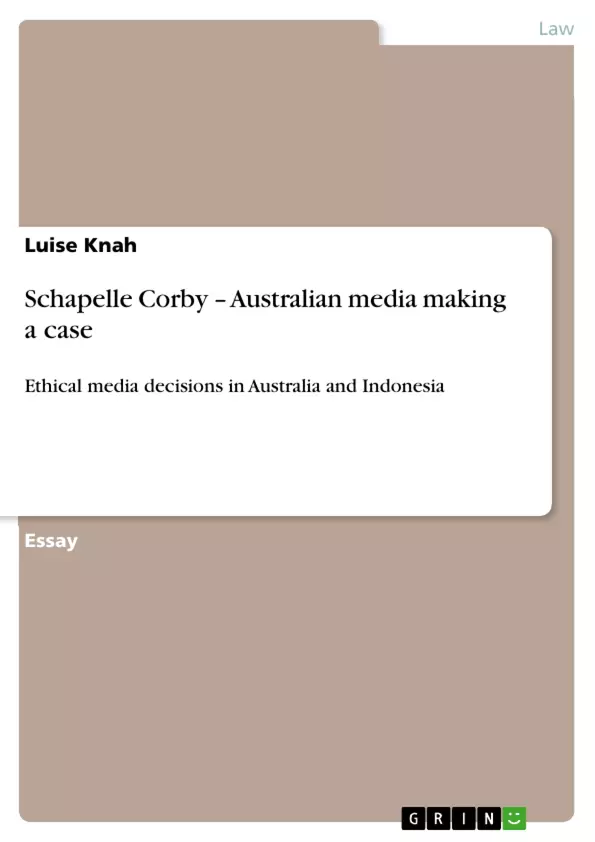The Schapelle case and its legal context as well as the related media coverage are a complex and wide field. The focus of this essay is set on ethical media responsibility and personalized reporting. The leading question is if the coverage of the Schapelle Corby case in Australia and Indonesia was ethical, and if the specific coverage might have effected the sentence.
Table of Contents
- Schapelle Corby - Australian media making a case
- The Australian media
- The Indonesian media
- The Schapelle Corby case
- The Australian media coverage
- The Indonesian media coverage
- Ethical media responsibility and personalized reporting
- The Australian Journalists Code of Ethics
- The impact of ethical breaches
- The Indonesian media evaluation
Objectives and Key Themes
This essay explores the ethical implications of media coverage in the Schapelle Corby case, focusing on the contrasting approaches of Australian and Indonesian media. It examines how personalized reporting in Australia may have influenced the outcome of the trial and investigates the extent to which the media's actions violated ethical principles.
- Ethical media responsibility in international cases
- The role of media in shaping public opinion and influencing legal processes
- The impact of personalized versus depersonalized reporting
- The influence of cultural and societal factors on media ethics
- The potential consequences of biased and sensationalized media coverage
Chapter Summaries
The essay first introduces the different media landscapes in Australia and Indonesia, highlighting their distinct journalistic values and ethical codes. It then presents the Schapelle Corby case and analyzes the contrasting approaches of Australian and Indonesian media coverage.
The Australian media's focus on personalization is examined through examples of biased reporting and the violation of ethical principles, including honesty, fairness, and respect for privacy. The essay analyzes the influence of this coverage on public opinion and explores the potential impact on the trial's outcome.
In contrast, the Indonesian media's coverage is characterized by a more depersonalized approach, emphasizing legal proceedings and the effects on tourism. The essay discusses the difficulties in evaluating the ethical implications of the Indonesian media's limited coverage.
Keywords
The key terms and concepts in this essay include media ethics, personalized reporting, depersonalized reporting, the Schapelle Corby case, Australian media, Indonesian media, Australian Journalists Code of Ethics, public opinion, and legal influence. The essay also explores themes related to cultural differences, media responsibility, and the impact of sensationalized coverage on international cases.
Frequently Asked Questions
What is the central focus of the Schapelle Corby media analysis?
The essay examines ethical media responsibility and how personalized reporting in Australia contrasted with the depersonalized coverage in Indonesia during the Corby trial.
Did Australian media coverage influence Schapelle Corby's sentence?
The essay investigates the possibility that biased and sensationalized reporting in Australia may have negatively impacted public opinion and potentially the legal process in Indonesia.
What ethical breaches are identified in Australian journalism?
The analysis points to violations of the Journalists Code of Ethics, specifically regarding honesty, fairness, and the respect for privacy through overly personalized storytelling.
How did Indonesian media coverage differ from Australian media?
Indonesian media took a more depersonalized approach, focusing on the legal proceedings and the broader implications for tourism rather than the individual's personal story.
What is the role of cultural factors in media ethics?
The essay highlights how different societal values and journalistic traditions in Australia and Indonesia led to vastly different portrayals of the same international legal case.
- Quote paper
- Luise Knah (Author), 2011, Schapelle Corby – Australian media making a case, Munich, GRIN Verlag, https://www.grin.com/document/179246



